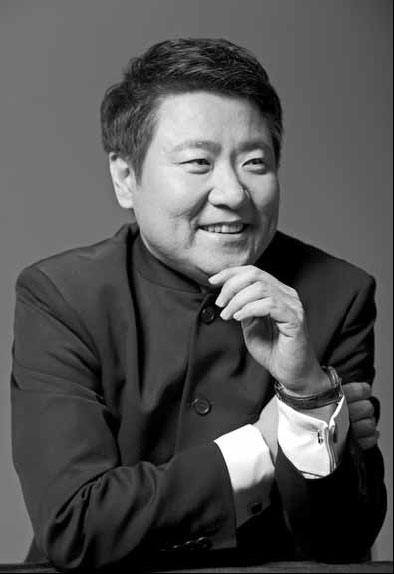Taking on Hollywood without the fanfare
Updated: 2012-06-06 10:50
By Wang Chao in Beijing (China Daily)
|
||||||||
|
Yu Dong, chairman and CEO of the Nasdaq-listed Chinese private film distributor Bona Film Group Limited, says co-production will become the savior of Chinese films. Provided to China Daily |
Chinese film company helps raise curtain for global audiences
Yu Dong, chairman and CEO of the Nasdaq-listed Chinese private film distributor Bona Film Group Limited, predicted that the real challenge for the Chinese movie industry from Hollywood will loom large in two to three years and said "we only have five years to catch up with our Hollywood counterparts".
The new film agreement which allowed the US to introduce 14 more movies to China a year in addition to the original 20 foreign film quota, will last for five years.
Yu said co-production will become the savior of Chinese films. "But co-production involves much more than adding Chinese characters into Hollywood films; it needs to incorporate Chinese themes and Chinese stories," he said.
His ideas have been embraced by a couple seeking opportunities in this fast-growing market - the Murdochs. Yu met Rupert Murdoch and his wife, Wendi Deng, at a party last June during the Shanghai Film Festival, and they quickly hit off on some common views on films.
During that time, Deng was promoting her first film investment, Snow Flower and the Secret Fan. "Wendi Deng is very passionate on films, every time she met me, she told me stories and ask me whether they could be adapted into films," Yu said.
Bona is already considering scripts suitable for both the Chinese and Hollywood markets and is discussing them with its partner.
Seventeen years ago, Yu was an ordinary distributor working for a Beijing film company, traveling across the country to get his films played in local theaters. As the founder and chief executive officer of Bona, Yu later spent 13 years building a small company, started with 300,000 yuan ($47,340) he borrowed from friends, into the country's largest privately owned film distributor.
In 2001, he obtained a distribution license for Bona, the first for a non-State-owned company in the history of China's film industry. Before Bona's license, only State-owned companies were allowed to distribute films.
Three years ago, Bona also became the first to establish a distribution company in Hong Kong, targeting the overseas market. Since then, the company has achieved steady revenue growth.
Yin Hong, director of the Center for Film and Television Studies at Tsinghua University, said the marriage between Bona and News Corporation is inevitable.
"The Western companies were far ahead of us in almost all areas at the beginning of 1980s when we introduced the very first partnerships, but now after three decades of dancing with the wolves, Chinese companies are getting much stronger," Yin said.
Bona's deal with News Corp was completed at almost the same time as Wanda's acquisition of AMC Theaters, the second-largest cinema chain in North America. While the Wanda transaction received a great deal of coverage, Bona kept a lower profile.
It somewhat reflected the "typical Yu Dong-style": Get the job done, without much fanfare.
Yu's 17-year career in film also coincided with the evolution of the Chinese film industry.
Yu now sees a brand new chapter opening before him. The investment in Bona by News Corp includes a provision that Bona's films be able to use the distribution and promotion platforms owned by the media giant.
"Now we have a much larger opportunity to bring Chinese films directly into the mainstream market through our relationship with News Corporation," Yu said.
Overseas distribution is already Bona's advantage over other non-State-owned film companies. In 2011, Bona earned more than $10 million from its overseas distribution.
Since 2009, the group has reaped about $40 million from overseas markets, topping all the other non-State-owned Chinese film companies.
Another of Bona's distribution channels, China Lion Film Distribution Inc, is dedicated to screening Chinese films in North America and New Zealand. The company earned about $1 million in box office receipts during the first four months of 2012.
"We have paved the way for our films. For the Chinese-language films, I screen them through the China Lion platform, while the English-language films which we are going to make through co-production will be released through our relationship with News Corp," Yu said.
In March, after Chinese Vice-President Xi Jinping visited the United States, China agreed to raise the import quota of US revenue-sharing films from 20 to 34, and to increase the revenue share for the US part from 13 percent to 25 percent.
Many in the Chinese film industry said the moves will not pose much of a threat to Chinese films because, even under the current structure, only about half of these Hollywood blockbusters are successful at the box office.
wangchao@chinadaily.com.cn

 Relief reaches isolated village
Relief reaches isolated village
 Rainfall poses new threats to quake-hit region
Rainfall poses new threats to quake-hit region
 Funerals begin for Boston bombing victims
Funerals begin for Boston bombing victims
 Quake takeaway from China's Air Force
Quake takeaway from China's Air Force
 Obama celebrates young inventors at science fair
Obama celebrates young inventors at science fair
 Earth Day marked around the world
Earth Day marked around the world
 Volunteer team helping students find sense of normalcy
Volunteer team helping students find sense of normalcy
 Ethnic groups quick to join rescue efforts
Ethnic groups quick to join rescue efforts
Most Viewed
Editor's Picks

|

|

|

|

|

|
Today's Top News
Health new priority for quake zone
Xi meets US top military officer
Japan's boats driven out of Diaoyu
China mulls online shopping legislation
Bird flu death toll rises to 22
Putin appoints new ambassador to China
Japanese ships blocked from Diaoyu Islands
Inspired by Guan, more Chinese pick up golf
US Weekly

|

|







